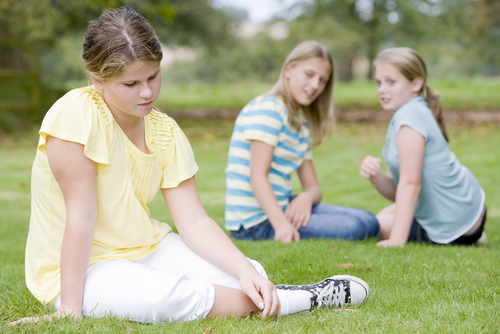
31 Oct Teaching Your Child to Include Others: Halloween Advice
 Halloween: Help Your Child Include Others
Halloween: Help Your Child Include Others
Halloween: A time for trick-or-treating, group costumes, pictures posted on social media. Inevitably, someone is left out. Below is advice on teaching your child to include others.
We tell our kids all the time, and especially on Halloween- “Don’t leave kids out. It’s not nice. How would you feel if kids did this to you?” It seems innate. But, what about the kids who, let’s just say, aren’t very likeable? The kid who eats glue, the kid who teases others, the kid who…I’m just going to say it..learned his bad behaviors from his mother! Oh yeah, I said it! I have heard this line from so many parents over the years, “Just stay away from him!” Is this realistic? Of course not, can we, as adults “just stay away from” anyone that is annoying or mean to us? We can’t. And, neither can our kids.
For all you moms of boys out there who are thinking, “this is such a girl thing. Boys don’t go through this.” I’m here to tell you that it’s not true. Girls just handle their rejection and rejecting differently.
Halloween is a common time where this issue occurs, as plans are often made by the kids. As parents, we need to be thinking about how to teach our children to include others in the festivities and get-togethers throughout the year. With social media, kids learn who was included in which group and who was left out- pictures are shared, videos are posted, and some kids aren’t in the group.
Empower Your Child to Include Others on Halloween and Every Day
1) Teach your kids how to handle the difficult situations on their own. DO NOT… I repeat DO NOT call other parents and tell them how their children behaved poorly. Parents who know their kids well would already know this and have not been able to change it yet. Parents who defend their kids to the end despite what everyone else tells them will make you sorry you ever brought up how their perfect child couldn’t possibly have done anything wrong. It’s a lose-lose situation.
2) When a child asks your child if he can join in the planned activity, teach your child this mantra, “I would love it if you could join us. That would be fun” (say this even if the child asking is the last person your child wants to join them). No questions asked.
3) If there are logistics involved that would truly make it difficult for a child to join (e.g. you have 7 kids and only 6 kids will fit in the car to the event), then teach your child the IDEA solution.
Problem-Solving Method: IDEA
I-Identify the problem (I would love for you to join us, but we have 6 kids and we can only fit 6 in the car. How can we solve this problem?)
D-Determine all solutions (if you can get a ride with us, that would work. Or, if your mom or dad can drive some kids, we can ask more kids to join us). List all solutions- even the ridiculous ones.
E-Evaluate solutions (Have your child think about possible consequences- both positive and negative, to all possible solutions he has found).
A-Assess whether the solution your child chose was the best solution and whether he would choose the solution again if the problem arose.
When Your Child Includes a Child who is Making it Difficult for the Group
1) Have the child join the group. If the child acts or says something upsetting to the other kids, teach your child to self-advocate and tell the newly added group member how his actions affect others. Use an I statement (best in the presence of others too): ” I feel/felt ____________________ (the feeling word) when you __________________ (the specific action the child did) and I would like _______________ (what you want the other person TO do, not what you want the other person to STOP doing).”
2) If the newly added group member cannot toe the line, she will realize that the actions and/or words she uses upsets the others and they don’t want to be with her if she continues to act that way.
3) If the newly added group member is enjoyable to be with, the group members will have the intrinsic reward of feeling good for including someone with whom they had a lot of fun!

Dori has provided therapeutic services to children, adolescents, adults, and families since 1994 in several areas of social work including foster care, schools, hospitals, and private practice. She earned her Master of Social Work from The University of Illinois at Chicago’s Jane Addams College of Social Work in 1997 and her Bachelor of Science in psychology from the University of Illinois at Urbana-Champaign.
She is an Amazon best-selling author and a professional speaker who has been interviewed on ABC, NBC, various podcasts, and radio shows as an expert discussing therapeutic topics and her published works.
Dori offers speaking presentations on various therapy-related topics including, but not limited to anxiety, depression, ADHD, executive functioning, life transitions, effective communication, parenting strategies, work/life integration, and even staying sane while staying informed. She also speaks to businesses and business owners about the importance of hiring for company cultural fit, networking, leadership, and business growth. As a multi-location private therapy practice owner, she provides a culture of accountability, compassion, and creativity, emphasizing the importance of collaboration (with client consent) with parents, teachers, and other professionals to provide the most beneficial services to achieve maximum results for all clients to translate to every aspect of their lives.
As a mother of three, she knows the excitement and challenges of navigating parenting, behavioral and emotional distress, social pressures and rejection, academic successes and struggles, and identity formation. Dori is passionate about providing clients with the tools they need to navigate the challenges they face now to improve their quality of life long after therapy ends.




No Comments